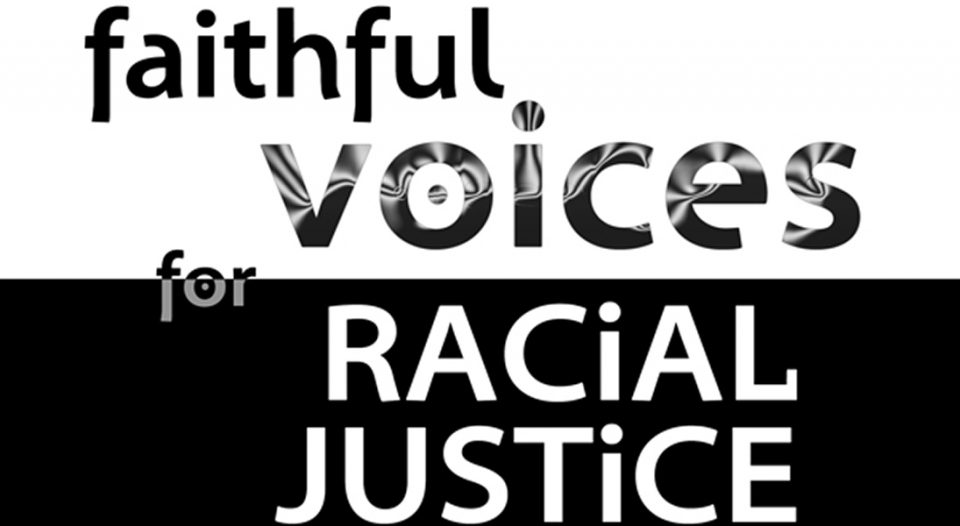After the murder of George Floyd and the calls for racial justice that followed, Connie Ryan, executive director for the Interfaith Alliance of Iowa, began gathering faith leaders from across the state on weekly Zoom calls. That group of leaders included Erika Uthe, director for evangelical mission and an assistant to the bishop in the Southeastern Iowa Synod.
Together, members of the alliance’s Faithful Voices for Racial Justice initiative have been planning programs, developing resources, equipping local leaders and congregations, and advocating at the municipal and state levels. In July 2021, when the Iowa Legislature limited what public schools could teach about systemic racism, some group members decided to develop a curriculum for congregations using as its basis “The 1619 Project,” a series of essays in the New York Times.
The six-week study series that resulted, “Faithful Conversations About the 1619 Project,” includes assigned readings, 30-minute online videos featuring faith leaders, and discussion guides for 30-minute, small-group conversation to follow the videos. This month, 16 synod congregations began using the resource as part of a study.
Living Lutheran spoke to Uthe about the development of the curriculum and the importance of such resources.
Living Lutheran: How did you and the other Interfaith Alliance of Iowa members decide on creating this study resource?
Uthe: Part of the legislation that limited diversity and inclusion training also included a ban on the teaching of the Pulitzer Prize–winning “1619 Project” [created] by Nikole Hannah-Jones, herself a native Iowan. It was decided that if schools could not teach history, then churches could—and a small group of faith leaders from Faithful Voices set out to develop a faith-based study of the essay. Pat Shipley, stated clerk of the Presbytery of the Missouri Valley (Presbyterian Church (U.S.A.)); Jaqueline Thompson, pastor of the historically Black Burns United Methodist Church in Des Moines; Meg Wagner, missioner for congregational development, communication and reconciliation for the Episcopal Diocese of Iowa; Connie Ryan of the Interfaith Alliance of Iowa; and [I] developed this six-week video study and gathered an interreligious panel to discuss this history through a faith lens.
It was decided that if schools could not teach history, then churches could.
What are your hopes for how people might utilize the study series?
The “Faithful Conversations” resource was developed with the hope of starting a conversation in congregations about how our own lens of viewing history itself keeps us blind from the realities of how racism has been and continues to be part of our societal makeup. Whether congregations use this in small groups, in book studies or for personal study, the more people [talk] about the untold history of our nation, the more we can work toward reconciliation, justice and reparation. It was also very clear that engaging the study was just a start—and that it would then spark further action, engagement with synod and local anti-racism efforts and [the creation of] a movement of congregations working toward racial justice.
How have you found engagement with the kind of racial justice curriculum that’s being banned in Iowa and other states to be important for you and for others?
The banning of [these essays] was part of a larger bill in Iowa that included harsher penalties for protesters and decriminalizing things like driving a car into protesters. It was a clear effort to silence an entire community of people—first by silencing the voices of history and then by silencing the voices attempting to make it known. Since racism, history, white supremacy and patriarchy continue to impact current policies, it is imperative that the voices of Black, Indigenous, people of color are elevated and heard. Time and again in the arc of Scripture we find God standing with the oppressed, marginalized and voiceless. What better place to do this than a faith community grounded in the very grace of God who has declared all creation good?
Why is it important for Lutherans, in particular, to engage with curriculum like this?
As Lutherans we have a rich understanding of vocation, and that vocation of citizenship [Martin Luther named] is of utmost importance at this stage of the [system of] democracy of the United States. Rather than disengaging or shying away from difficult, often divisive topics, our grounding in the grace of a God who declares that friends and enemies alike are to be loved, be forgiven and receive mercy empowers [people of European descent] to engage the stories of our siblings of color with open hearts and minds as we strive for reconciliation and reparations.
The ELCA has long had diversity and inclusion goals, but while our neighborhoods have increased in racial diversity, our denomination has remained primarily white. I think we need to ask ourselves—congregations, members, pastors, deacons and leaders—why this is. We need to acknowledge and repent of the ways our own institution has benefited from and continues to perpetuate racism, and then work to actually do the hard work of changing. We need to ask why seminary graduates who are people of color wait years for a first call in a denominational landscape that is facing a “shortage” of pastors, and why, when they do get a call, [they] do not receive a living compensation. More than simply engaging in more anti-racism trainings, a study like this points out how systems, not just individuals, are part of the larger web that disproportionately benefits white leaders and congregations and invites the reader to move to action.






